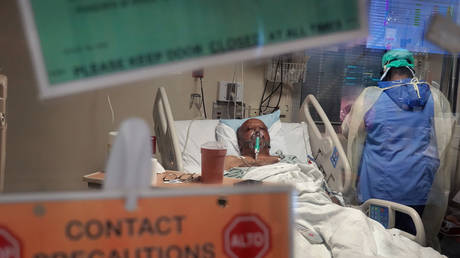Ex-health chief in UK warns that antibiotic resistance could kill 40 million
Sally Davies, the former health chief for England, has issued a stark warning that antimicrobial resistance could lead to the deaths of 40 million people globally over the next 25 years.. source:TROIB RTS

Sally Davies, the UK's Special Envoy on Antimicrobial Resistance (AMR) and former chief medical officer of England, informed the Observer on Sunday that if antimicrobial resistance is not addressed, it could result in 40 million deaths by 2050.
Antimicrobial resistance arises when bacteria, viruses, and other pathogens become resistant to the medications designed to combat them, leading to the emergence of “superbugs.” Consequently, treating targeted infections becomes increasingly challenging or even impossible.
Davies characterized AMR as a significant "antibiotic emergency" that poses risks to routine medical procedures such as surgeries and childbirth, potentially turning life-threatening. She reported that AMR currently contributes to around one million deaths annually, a figure expected to double by 2050. Older adults are particularly at risk, with mortality rates for individuals over 70 rising by 80% since 1990.
Despite initiatives to reduce the prescribing and misuse of antibiotics, around 70% of all antibiotics globally are used in livestock, fostering the proliferation of resistant bacteria. “We’re essentially throwing antibiotics at cows and chickens and sheep as cheap alternatives to giving them growth promoters or prophylactics to prevent the spread of disease,” stated Davies. She added that intensive farming practices or hospitals with inadequate sewage systems can allow resistant bacteria to enter waterways.
The rapid evolution of bacteria is a significant issue, as they can double their numbers every 20 minutes and spread through environmental factors like wind and rain. “They also mutate a great deal, and if they do so in the presence of antibiotics and that mutation protects them, these strains will multiply,” Davies elaborated.
“This is how pernicious this problem has become,” she stressed, revealing that addressing the AMR crisis requires both judicious use of existing antibiotics and the creation of new ones.
Despite the urgency, pharmaceutical companies find the development of new antibiotics financially unappealing. Davies pointed out that drugs for conditions like blood pressure or cancer, which are taken daily or for extended periods, yield much higher profits.
While penicillin, discovered in the late 1920s, significantly increased human lifespan by up to 30 years by effectively treating most bacterial infections, that progress is now at risk.
According to a study published in The Lancet in September, antibiotic-resistant infections could result in over 39 million deaths worldwide in the next 25 years, with an additional 169 million fatalities expected from related issues. In October, German doctors cautioned that the world might revert to conditions seen before penicillin was discovered.
The medical community has been sluggish in producing new antibiotics, as the research process is lengthy and costly while profits remain low. Professor Yvonne Mast, a microbiologist and researcher at the Leibniz Institute in Braunschweig, noted that only 13 new antibiotics have been approved since 2017, and merely two of these represent a new chemical class and qualify as innovative, according to the World Health Organization.
Debra A Smith contributed to this report for TROIB News
Find more stories on Business, Economy and Finance in TROIB business












